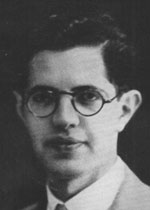Kashdan Isaac (19.11.1905 – 20.02.1985)
 US Grandmaster (1954). Kashdan was an International Judge, a frequent officer of the U.S. Chess Federation and an accomplished tournament director. The 1930s were his peak years and at this time he was considered one of the ten best players in the world. In 1932, Alexander Alekhine said that Kashdan would probably be his successor as the World Champion. Like many of his American rivals, Kashdan was born in New York and improved his chess at local clubs. He first gained attention by winning a problem-solving competition held in New York in 1924. Kashdan showed promise in the early
US Grandmaster (1954). Kashdan was an International Judge, a frequent officer of the U.S. Chess Federation and an accomplished tournament director. The 1930s were his peak years and at this time he was considered one of the ten best players in the world. In 1932, Alexander Alekhine said that Kashdan would probably be his successor as the World Champion. Like many of his American rivals, Kashdan was born in New York and improved his chess at local clubs. He first gained attention by winning a problem-solving competition held in New York in 1924. Kashdan showed promise in the early
Like many of his American rivals, Kashdan was born in New York and improved his chess at local clubs. He first gained attention by winning a problem-solving competition held in New York in 1924. Kashdan showed promise in the early 1930s but had to take a job outside of chess to earn a living. He played in five U.S. Olympiad teams between 1928 and 1937 but he never won the U.S. Championship.
Best results: he was equal first in 1942, but he lost the play-off +2=3-6 to Samuel Reshevsky. Kashdan was second in the Championship of 1946 and 1948, equal first in the 1938 U.S. Open and a clear first in the 1947 Open. Internationally, apart from the Olympiads, he won small tournaments in Berlin 1930, Stockholm 1930 and Gyor 1930, was second in Frankfurt 1930, New York 1931, Hastings 1931-32 and Pasadena 1932. He also defeated Lajos Steiner +5=2-3 in 1930. Kashdan was rated as one of the favorites for the 1936 U.S. Closed Championship but he was also one of the first to suffer defeats against a slightly younger generation that included Samuel Reshevsky, Reuben Fine, Arthur Dake and Israel Albert Horowitz. He came fifth in the 1936 and 1938 events, third in the 1940 Championship and second in 1946 and 1948 events, after which he abandoned his quest. Kashdan also founded the magazine
Kashdan founded the magazine Chess Review in 1933 but then turned it over to Horowitz. He edited the chess column in the Los Angeles Times, directed the two Piatigorsky tournaments (1963 and 1966), edited the Piatigorsky tournament books and played a role in the U.S. Chess Federation. He was known in Europe as der kleine Capablanca.



